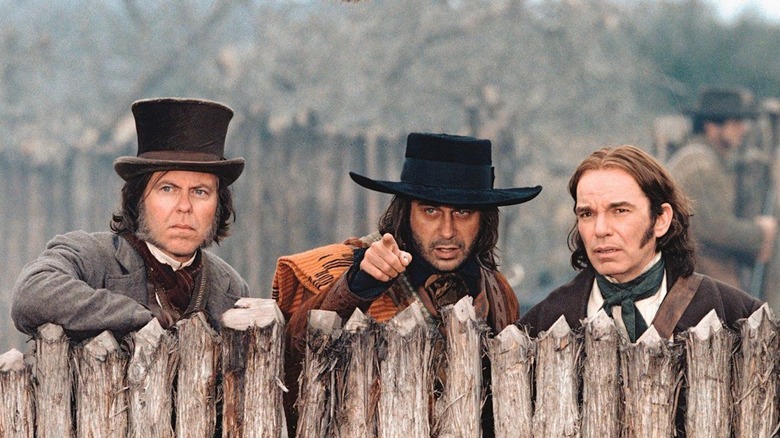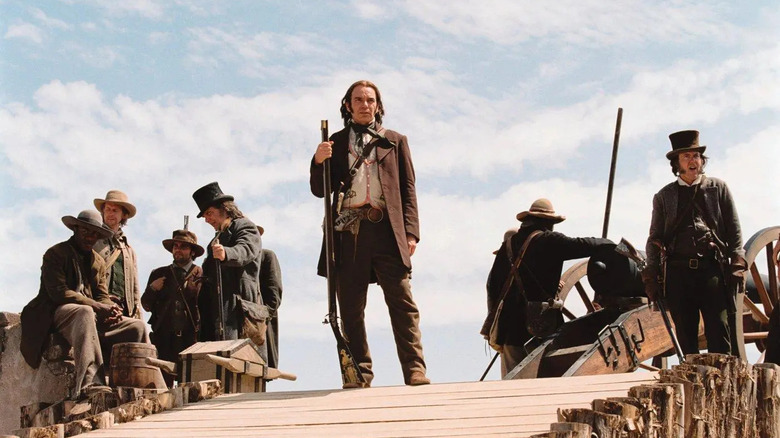The Alamo Was One Of The Biggest Box Office Flops Of All Time – What Happened?
If I ask you the question, "do you know why the Alamo movie flopped?," you're likely to have one of three answers, none of them flattering. "Which Alamo movie flop?" "They made a movie about the Alamo?" "Why are you at my birthday party? Do I know you?"
You'll be forgiven, in other words, if you don't remember "The Alamo." Long ago, before IP took over the world, Hollywood used to throw massive, just ungodly amounts of cash behind widescreen epics — historical, romantic, fantastic, it didn't matter. The abiding principle was that once the weather started to warm up, people would always want to go to an ice-cold movie theater and watch something about huge feelings that featured huge movie stars evading huge explosions.
That is exactly the setup for "The Alamo," the 2004 chapter in a long history of failed attempts to make American audiences care about the Battle of the Alamo. D.W. Griffith failed in 1915 ("The Martyrs of the Alamo"), Disney failed in 1950 ("Davy Crockett"), and John Wayne did an okay job in 1960 ("The Alamo"). A battle in which an insurgent band of Mexican soldiers reclaimed a contested military outpost near San Antonio, laying waste to virtually every white settler in sight and prompting an outsize wallop of revenge, leading to the cessation of the landmass that would become Texas and the outbreak of the bloody Mexican-American war sounds dramatic enough for a good movie. So why hasn't one been made? And what made John Lee Hancock's 2004 effort in particular such a bomb? Let's explore!
You know what, actually yeah, do remember The Alamo
Let's go back to 2004. The wretched turmoil generated by the September 11th attacks still gripped the populace, the US' illegal war in Iraq had been raging for a year, and the Great White Shame of Texas, George W. Bush, sat in the White House.
If anything, the confused, jingoistic times may have lent themselves to a tale of bloodthirsty American revenge against a foreign enemy who absolutely didn't deserve it. The trouble with "The Alamo" started long before audiences even saw it, but it didn't help that Hancock's take on the great American myth actually treated it as just that — a myth, one which gave soul and dimension to its Mexican characters, and ruminated upon the power of patriotic hubris. But these were not times for nuance.
The truth is "The Alamo" was doomed from the start. Ron Howard dropped out as director early on after realizing he'd be unable to fulfill his preposterous ambition of making "a new 'Wild Bunch.'" Despised Disney CEO Michael Eisner then handed the film over to Hancock, a relative unknown, and under his stewardship, the film suffered many highly publicized delays, walk-offs, and budget overruns. Set for a Christmas 2003 release, the film was pushed back and dropped without much ceremony in April 2004. On the left, history buffs groused about its inaccuracies and racism, and on the right, there were complaints the film was too sympathetic to the Mexican army.
"The Alamo" brought in a mere $25 million worldwide on a $100 million+ budget, which is a shame, because honestly, it's kind of a fascinating film. Hancock attempts to take American history by the horns, and though he's gored quite a bit, he emerges on the other side of the ring with one of the more sensitive war films of the period. One worth watching today.

